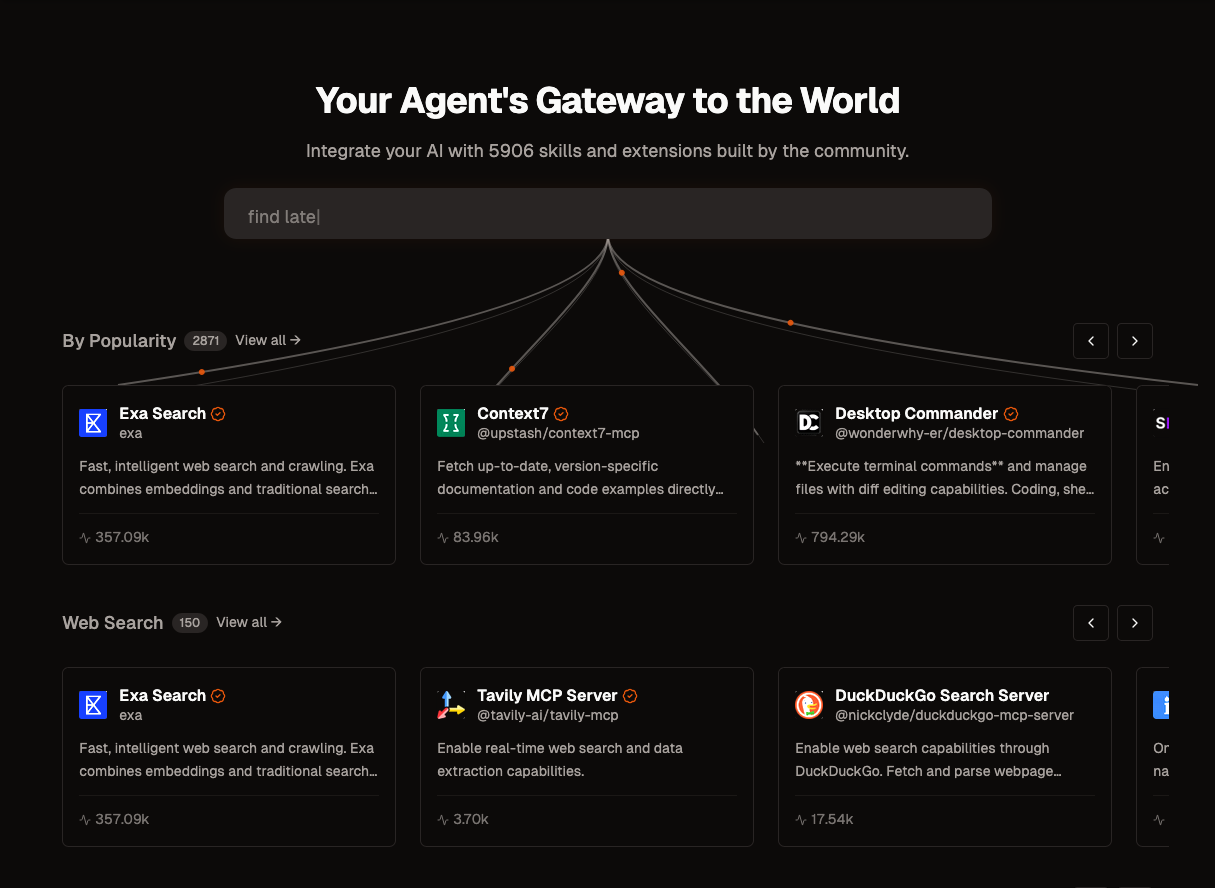
Smithery is shaping the agent-first internet—for builders and bots alike
When I talked to Henry Mao, founder of Smithery, I quickly realized he's betting on a future where the internet isn't navigated by clicks, but rather tool calls. Where AI agents, not humans, become the internet's primary users.
Henry says that in this new world, “there needs to be a new layer of infrastructure to help agents discover services, vet services, and help developers of these services ship them well.”
Henry’s team at Smithery calls it "your agent's gateway to the world." One one side, it's a tool for you to build, test, and distribute your Model Context Protocol (MCP) servers, and on the other, it's a "Google for MCPs" that offers AI agents a comprehensive marketplace to find and properly consume all the tools available to them.

More than a directory
While "MCP marketplace" is the simplest description you can plop on what Smithery does, their vision is bigger than a list of tools.
Henry frames it like this: “We’re solving a more future-looking problem. Today, AI agents are finicky. They require a lot of human-in-the-loop. You have to correct their course because they get things wrong. You have to copy and paste between apps. That’s not the promise we were sold.”
Instead, Henry wants a future where agents behave more like capable co-workers who can interact with ten different products, pull together context, and take action without hand-holding. The missing piece is a way for these agents to know what tools exist, what they do, and what opinions to hold that ensure they use them well.
So what does that mean? Just like a good UI anticipates human quirks, every LLM has its own idiosyncrasies: sometimes they need more explicit instructions, sometimes they struggle with too much context, sometimes they respond better when information is structured in a particular way. Smithery’s job isn’t to prompt engineer these agents directly—it’s to give MCP developers the tools to design, document, and benchmark their services so that agents can use them successfully.
That means opinionated defaults about how context should be presented, guidance on being explicit where it matters, and testing frameworks that show how an MCP performs across different LLMs. In short: Smithery helps vendors “prompt engineer their MCPs” so that when those MCPs reach agents, they just work.
How they've embedded ngrok into the Smithery CLI
Speaking of developers—it's not all about agent experience over at Smithery.
Smithery has developed its own Node-based CLI tool, @smithery/cli, to help you build and test MCPs locally. Once you’ve downloaded the CLI, logged in, and saved your API key, a few things happen:
- You run
npm create smitheryto start a local hot-reloading MCP development server on port3000. - The Smithery CLI uses your API key to fetch a temporary auth token and domain from Smithery's backend, which then creates an ACL in Smithery's ngrok account to keep everything well-scoped and prevent any funny business.
- ngrok's Node.js SDK starts a secure tunnel using that temporary auth token.
You can now iterate on your locally-hosted MCP while instantly testing them against Smithery's playground without setting up complex networking, installing other software, or even having to create an ngrok account of your own.
Smithery handles the ngrok infrastructure and costs, so the process is seamless. “Our goal is to create a really great developer experience. We remove every single friction,” Henry says. Embedding ngrok into the CLI is a big part of that philosophy.
What's next for Smithery?
In the near term, Smithery is doubling down on helping you create MCPs on two main fronts—testing and observability:
- Testing: Moving from ad-hoc playground trials to true “agent unit tests” that simulate real-world LLM interactions with MCPs.
- Observability: Providing detailed logs so you can see exactly how their tools are being called, diagnose issues, and improve over time as you build MCPs.
But the bigger picture is more ambitious. Henry and his team are looking toward a world where AI agents can instantly discover, evaluate, and use the best-fit tools for any job—tools that were designed from Day 0 not for people, but for agents themselves.
As Henry puts it: “The [MCP] protocol is here to stay. It’ll evolve, sure, but what really matters is that more and more services are going to be built for agents. Our job is to make sure they’re not just available, but usable—and that the experience is great, from the first call.”
That’s the vision Smithery is building toward: an internet where agents don’t just exist, but thrive—because they finally have the right tools, and the right marketplace, at their fingertips.

